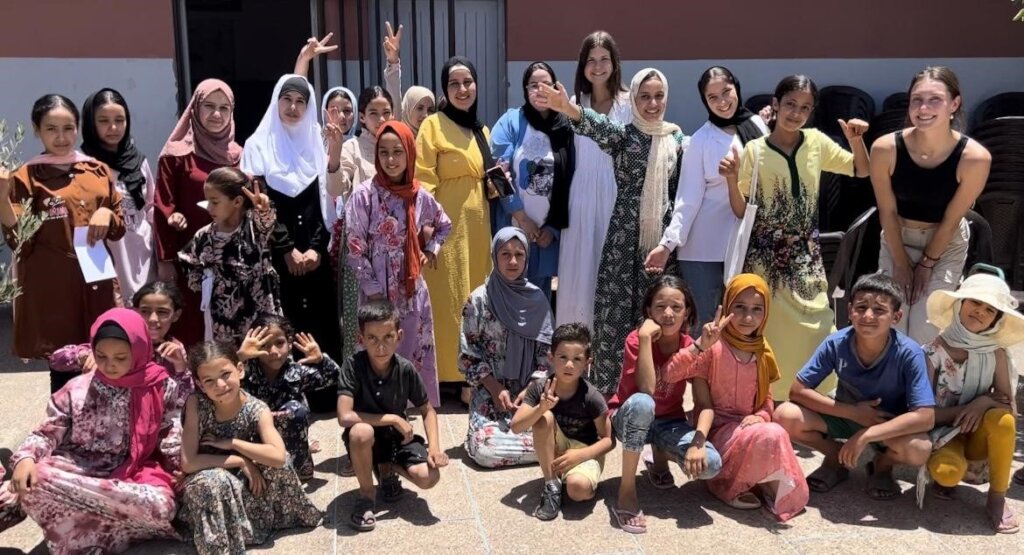By Hallie Stallings | HAF intern
I first met Miriem, Sarah, and Naima at a community room in the village of Achbarou, which is about a thirty-minute drive from Marrakech, Morocco. We instantly bonded over drawing and forming hearts with our hands, teaching each other the words for “love” in Tachelhit and English. Eyes twinkling with wonder, they told me of their dreams to become doctors, singers, and police officers. They were eager to learn English, and I was excited at the opportunity to support their bright futures. When joined by the boys in a co-ed classroom, however, their inner sparkles dwindled. Miriem, Sarah, and Naima rarely participated and preferred the boys to speak for them.
Would a single-sex classroom instill in these girls, and girls everywhere, the confidence to pursue their ambitions?
The benefits of all-girls schools are numerous and well documented: single-sex schools have consistently produced graduates with significant academic capabilities and confidence. School officials in single-sex schools report that test scores and attendance rates increase, and studies have shown that single-sex private schools produce higher SAT scores and AP scores than comparable co-ed private schools.
The benefits of single-sex education spread beyond that of test scores. Girls are more likely to “participate in discussions,” ask for help, and feel “comfortable being themselves.” Strikingly, female graduates of single-sex schools self-report higher academic confidence than graduates of other institutions, which is incredibly important, given that “pride in schoolwork is the most important factor in girls’ self-esteem.”
Female graduates from single-sex schools also pursue traditionally male-dominated fields and majors at higher rates than co-ed graduates, aspire to more prestigious careers, and hold less stereotypical attitudes about male and female sex roles. Based on my observations, villages like Achbarou benefit tremendously from girls in their community pursuing education. Most girls and women in Achbarou yearn for knowledge. Trusted role models and mentors from their village can expedite the process of girls completing their degrees and transform perceptions of educated women.
Despite the academic benefits of single-sex education for girls, co-ed education has the potential to eradicate gender stereotypes and uphold classroom equity. In many school systems, boys are becoming the disadvantaged group (in America, the average eleventh-grade boy writes at the same level as the average eighth-grade girl). Co-ed instruction has been found to be more conducive to boys’ learning styles and to reduce gender stereotyping. In English classes, for example, it is beneficial to “hear the views of the other sex on the social and emotional issues discussed.” Co-ed schools also have social benefits; graduates of single-sex schools have been found to take longer to adjust to university.
However, studies argue that co-ed or single-sex education makes no significant difference, and instead, one should focus on systemic change to education systems. Many studies of single-sex education have found the data unsubstantial due to the difficulty of controlling for a single variable like gender. For example, one case study in the UK found that the quality of the teacher was more important than their gender. Another UK study even found that the girls involved preferred mixed classes.
Given the ambiguous answer on single-sex versus co-education, Moroccan development organizations can utilize aspects of single-sex education when empowering girls. One example is girls' support groups within co-ed schools. Girls have specific gender-based needs, such as confidence and navigating family and stereotypes, that can be positively addressed in support groups. Girls on the Run, an empowerment program based in the United States, found that “85% of girls improved in confidence, caring, competence, character development, or connection to others.” The benefits of girls’ empowerment programs are not limited to the participants. A 2002 USAID scholarship program for girls in Morocco led to participants hosting literacy classes for other girls and changing the stereotypes of educated women in their village.
Single-sex education has many benefits for girls, including higher test scores and confidence in the classroom. Yet, co-education is important for social development. Ultimately, what matters most is providing girls the opportunity to attend school. Once a secondary school, or even a university, is built within walking distance of Achbarou, those promoting development should utilize girls' support groups in co-ed schools as an effective tool for girls' empowerment.
Miriem, Sarah, and Naima are bright stars, capable of illuminating their village and Morocco with swaths of glorious energy bound up in their wide smiles and welcoming hearts. We must help keep their lights alive, adding fuel to their fire wherever we can.
Project reports on GlobalGiving are posted directly to globalgiving.org by Project Leaders as they are completed, generally every 3-4 months. To protect the integrity of these documents, GlobalGiving does not alter them; therefore you may find some language or formatting issues.
If you donate to this project or have donated to this project, you can recieve an email when this project posts a report. You can also subscribe for reports without donating.
Support this important cause by creating a personalized fundraising page.
Start a Fundraiser